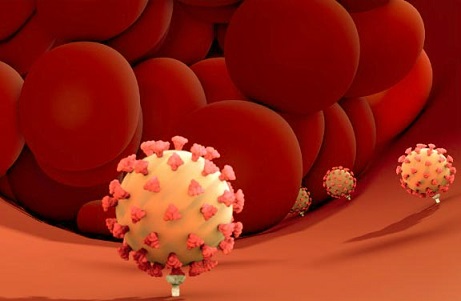Italian and Swiss scientists find that SARS-CoV-2 main protease plays a crucial role in blood clot formation
Nikhil Prasad Fact checked by:Thailand Medical News Team Sep 08, 2024 1 year, 2 months, 4 weeks, 1 day, 13 hours, 4 minutes ago
Medical News: In the quest to unravel the mechanisms behind the severe complications of COVID-19, a new study has shed light on a crucial player in blood clotting among SARS-CoV-2 patients. Researchers from the University of Padua-Italy and ETH Zürich-Siwtzerland discovered that the SARS-CoV-2 main protease (Mpro) can activate blood coagulation factors, significantly increasing the risk of thrombosis. This
Medical News report explores how Mpro influences blood clotting, offering insights into one of the deadliest aspects of COVID-19.
 SARS-CoV-2 main protease plays a crucial role in blood clot formation
Understanding the Link Between COVID-19 and Thrombosis
SARS-CoV-2 main protease plays a crucial role in blood clot formation
Understanding the Link Between COVID-19 and Thrombosis
COVID-19 patients, particularly those in critical condition, have exhibited a heightened risk of blood clots. Although doctors have long suspected that this hypercoagulability is driven by the inflammatory responses in the body, the specific molecular mechanisms were unclear. Thrombosis, a condition characterized by the formation of dangerous blood clots, increases the risk of severe complications like strokes, heart attacks, and even death.
The Study's Key Findings:
The research team discovered that when Mpro was added to healthy human plasma, the likelihood of blood clot formation increased by 2.5 times. The enzyme Mpro, also known as the SARS-CoV-2 main protease, activated key clotting factors in the blood, notably coagulation factors VII and XII. These factors are essential players in the coagulation cascade, the process that leads to blood clot formation. Coagulation factors act like a chain reaction in the blood to stop bleeding, but when they are activated excessively, they cause harmful blood clots.
The team found that Mpro cleaved these coagulation factors at specific sites, particularly at the bonds of Arg152-Ile153 in FVII and Arg353-Val354 in FXII, which are the primary sites where these factors are activated under normal physiological conditions. The researchers' experiments revealed a secondary specificity of Mpro for cleaving peptide bonds with arginine (Arg) in the P1 position, suggesting a more versatile role for the protease in activating the coagulation system.
Why Mpro’s Involvement in Blood Clotting Matters
The ability of Mpro to activate coagulation factors marks an important discovery in understanding COVID-19’s connection to thrombosis. This finding suggests that the virus doesn’t just rely on the body's inflammatory responses to increase the risk of blood clots, but that the virus itself, through its protease, is directly contributing to this dangerous complication. The enzyme seems to mimic some properties of human coagulation factors like thrombin, further amplifying the risk of blood clot formation in infected individuals.
The Role of Mpro in SARS-CoV-2 Pathogenesis
SARS-CoV-2’s Mpro is one of two key proteases responsible for processing the virus's replication machinery. Wi
thout Mpro, the virus cannot mature and replicate efficiently. But now, this new study shows that Mpro does more than just help the virus replicate - it also seems to interfere with the host’s clotting system. The researchers note that Mpro can be detected in the blood of COVID-19 patients, which supports the idea that the protease may be circulating in the bloodstream and interacting with plasma proteins like coagulation factors.
The research team’s use of advanced mass spectrometry methods and biochemical assays allowed them to confirm this interaction. They demonstrated that Mpro could cleave specific sites on coagulation factors VII and XII, leading to their activation. These factors are essential components of the extrinsic and intrinsic pathways of blood coagulation, respectively, meaning that their activation can lead to a rapid formation of blood clots.
Potential Therapeutic Implications
The study's findings open the door for new therapeutic approaches to COVID-19. While anticoagulants, such as heparin, have been commonly used to manage blood clots in COVID-19 patients, these drugs are not always effective, especially in critically ill patients who are at higher risk of bleeding. By targeting Mpro directly, new therapies could potentially prevent the protease from activating coagulation factors, reducing the risk of thrombosis without increasing the risk of bleeding.
Inhibitors of Mpro, like PPACK and Argatroban, have shown some promise in preliminary experiments. These inhibitors can bind to the active site of Mpro and prevent it from cleaving coagulation factors. The researchers suggest that further development of Mpro inhibitors could lead to safer anticoagulant therapies for COVID-19 patients, particularly those at high risk for thrombotic complications.
Conclusions
This groundbreaking study reveals the significant role that SARS-CoV-2’s main protease (Mpro) plays in promoting blood clot formation. By directly activating coagulation factors VII and XII, Mpro contributes to the hypercoagulability observed in severe COVID-19 cases. This discovery not only enhances our understanding of the molecular mechanisms behind COVID-19-related thrombosis but also paves the way for potential new treatments targeting Mpro.
For the millions of individuals affected by COVID-19 worldwide, understanding the virus’s impact on the blood clotting system could lead to more effective strategies to prevent the devastating consequences of thrombosis.
The study findings were published on a preprint server and are currently being peer reviewed.
https://www.biorxiv.org/content/10.1101/2024.09.05.611400v1
For the latest COVID-19 News, keep on logging to Thailand
Medical News.
Read Also:
https://www.thailandmedical.news/news/german-study-finds-that-sars-cov-2-mpro-reacts-to-oxidation-by-creating-disulfide-and-nos-sonos-bonds
https://www.thailandmedical.news/news/covid-19-herbs-study-finds-that-galangal-cinnamon-spice-mixture-blocks-coronavirus-infection-pathway-through-inhibition-of-sars-cov-2-mpro
